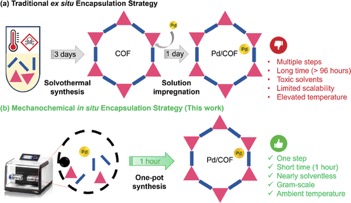Scientific Achievement

Foundry users and staff developed a one-step, time-efficient, and environmentally benign mechanochemical synthesis method for palladium-encapsulated covalent organic framework (COF) catalysts.
Significance and Impact
This is the first time mechanochemistry has been applied to the synthesis of metalated COFs. The new method is more sustainable than previous methods and reduces the production time from several days to just one hour.
Research Details
- In the new method, a ball mill – an instrument in which materials are crushed by grinding spheres – is used to combine the ingredients needed to create metal encapsulated COFs.
- The COFs were evaluated to see how porous and crystalline they are and how much metal was added to the structure.
Brown, N., Zhang, Q., Alsudairy, Z., Dun, C., Nailwal, Y., Campbell, A., Harrod, C., Chen, L., Williams, S., Urban, J.J., Liu, Y., Li, X. ACS Sus. Chem. Eng.. 12, 36: 13535 – 13543. (2024) DOI:10.1021/acssuschemeng.4c04003
Research Summary
Metal encapsulated COFs are typically made using a multi-step process over several days in which COFs are created first, and the metal species are incorporated afterwards. This method also requires hazardous solvents, high temperatures, and air-free conditions. In contrast, the new method developed by researchers from Clark Atlanta University and Molecular Foundry staff is a one-step process that occurs in a single pot – like a weeknight one-pot pasta recipe – in one hour at room temperature without the need for toxic solvents or air-free conditions. This new, rapid way of creating COFs is made possible by mechanochemistry, the process by which mechanical force can be used to induce chemical reactions to occur.
The COFs were evaluated to see how porous and crystalline they are and how much metal was added to the structure. Additionally, powerful transmission electron microscopes were used to visualize the COF structure and the distribution of metal throughout. As a proof of concept, the COF material developed through the team’s new, one-step approach was successfully used for the Suzuki-Miyaura coupling reaction, a widely used method in organic chemistry for forming carbon-carbon bonds. Looking to the future, this one-pot COF method can be applied to different metals and different COFs for a range of energy applications.

